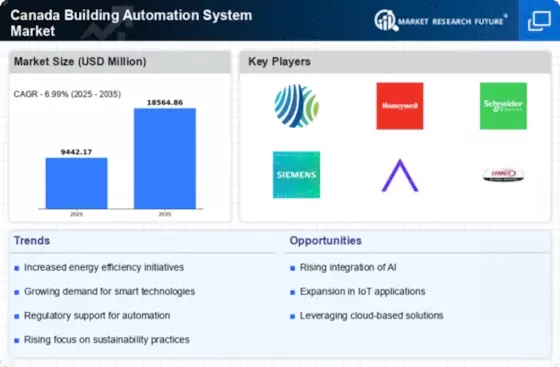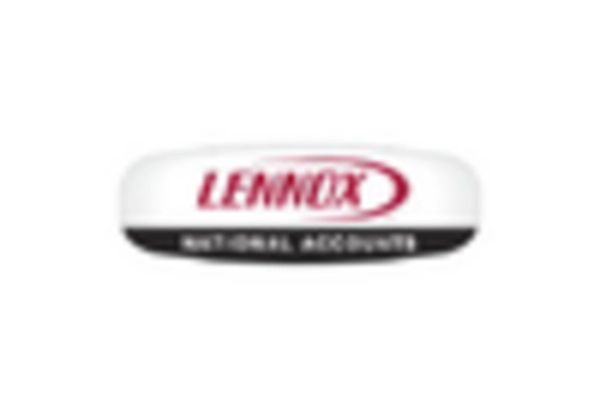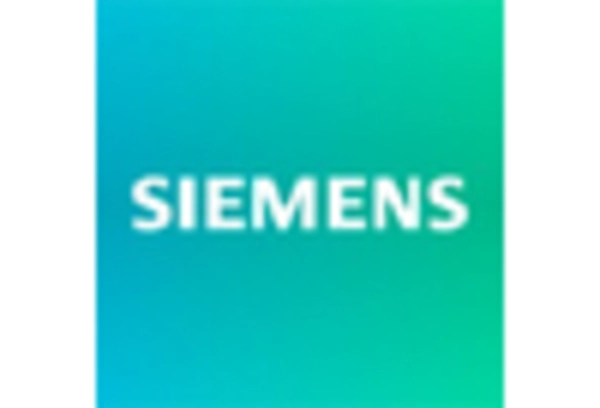Government Incentives and Support
The Canada Building Automation System Market benefits from various government incentives and support programs aimed at promoting energy efficiency and sustainability. Federal and provincial governments have implemented numerous initiatives to encourage the adoption of building automation technologies. For instance, programs that offer financial incentives for energy-efficient upgrades are becoming more prevalent. These initiatives not only alleviate the financial burden on building owners but also stimulate market growth by making advanced automation solutions more accessible. Furthermore, the Canadian government's commitment to reducing greenhouse gas emissions aligns with the objectives of the building automation sector, fostering a conducive environment for innovation and investment in this market.
Advancements in IoT and Connectivity
The proliferation of Internet of Things (IoT) technologies is transforming the Canada Building Automation System Market. Enhanced connectivity and the ability to integrate various devices and systems are driving the adoption of smart building solutions. IoT-enabled building automation systems allow for seamless communication between devices, enabling real-time data collection and analysis. This capability not only improves operational efficiency but also enhances predictive maintenance, reducing downtime and operational costs. As more building owners recognize the benefits of IoT integration, the demand for sophisticated automation solutions is expected to rise, positioning Canada as a leader in smart building technologies.
Increased Focus on Health and Safety
The Canada Building Automation System Market is witnessing an increased focus on health and safety within built environments. Building owners and managers are increasingly prioritizing the well-being of occupants, leading to the adoption of automation systems that enhance indoor air quality, lighting, and overall comfort. Technologies that monitor air quality and adjust ventilation systems accordingly are becoming essential in commercial and residential buildings. This trend is further supported by regulatory guidelines that emphasize the importance of health and safety in building design and operation. As a result, building automation systems that address these concerns are likely to see heightened demand, reflecting a broader societal shift towards healthier living and working environments.
Growing Demand for Energy Management Solutions
The Canada Building Automation System Market is experiencing a notable surge in demand for energy management solutions. This trend is largely driven by the increasing emphasis on sustainability and energy efficiency across various sectors. According to recent data, energy consumption in commercial buildings accounts for a significant portion of Canada's total energy use. As a result, building owners and operators are increasingly adopting automation systems to monitor and optimize energy usage. These systems not only help in reducing operational costs but also contribute to meeting governmental energy reduction targets. The integration of advanced analytics and real-time monitoring capabilities within building automation systems further enhances their appeal, making them indispensable tools for energy management in Canada.
Rising Urbanization and Infrastructure Development
Urbanization in Canada is accelerating, leading to increased infrastructure development and a corresponding rise in the demand for building automation systems. The Canada Building Automation System Market is poised to benefit from this trend as cities expand and new commercial and residential buildings are constructed. With urban areas becoming more densely populated, the need for efficient building management systems becomes paramount. Automation technologies facilitate better control over lighting, HVAC, and security systems, thereby enhancing occupant comfort and operational efficiency. As municipalities prioritize smart city initiatives, the integration of building automation systems is likely to play a crucial role in shaping the future of urban living in Canada.















